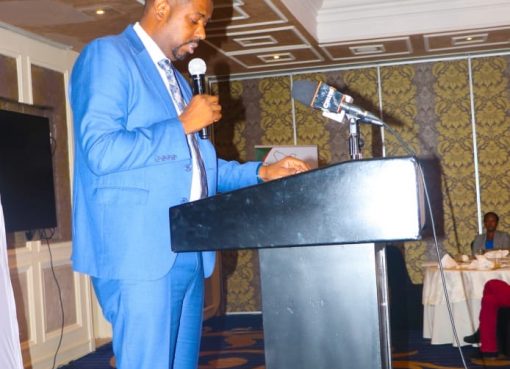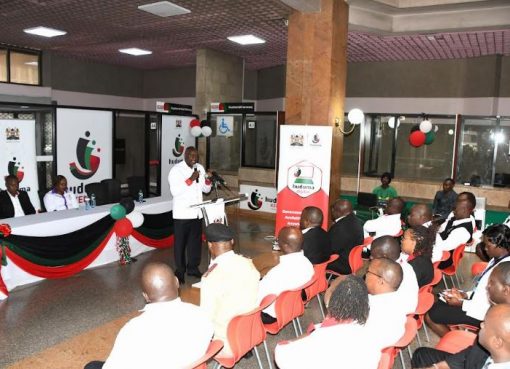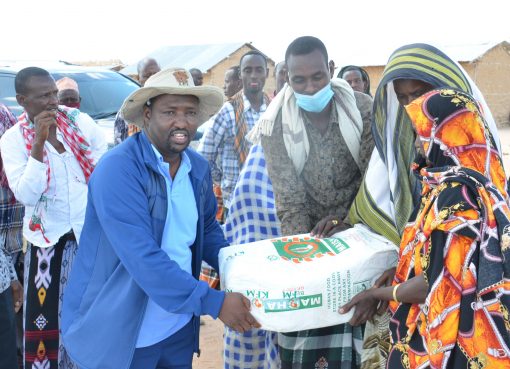Farmers in Migori County were exposed on Thursday to innovative modern technologies to help them adapt to the ongoing climate change and foster sustainable food production.
They were trained on multiple farming techniques that were showcased in an exhibition led by the County Executive Committee Member (CECM) in charge of Fisheries, Agriculture, and Livestock, Lucas Mosenda, at Kambogo chief’s camp in West Kanyamkago location of Uriri sub-county.
The training forum was mainly geared towards revolutionizing agricultural practices through the adoption of cutting-edge farming techniques.
According to Mr. Mosenda, this is an initiative of Migori County and other partner organizations.
Among the key technologies imparted during the event was the adoption of drought-resilient crops, which demonstrate high yields even under adverse conditions, safeguard farmers’ livelihoods, and ensure a stable food supply.
Farmers were also introduced to advanced water management technologies, including drip irrigation, soil moisture sensors, and water recycling systems.
By optimizing water usage and minimizing wastage, these technologies promote efficient resource utilization and contribute to the conservation of this precious natural resource.
To further enhance farming practices, farmers became acquainted with farm management software and data analytics tools.
Through analyzing vast amounts of data and making data-driven decisions, farmers can optimize planting schedules, predict yield potential, monitor resource usage, and identify areas for improvement.
This integration of technology empowers farmers to embrace sustainable practices and make informed choices, fostering long-term viability in agricultural endeavours.
Speaking while officially opening the one-day event, Mosenda highlighted the significance of providing training and support to farmers in the adoption of innovative technologies to ensure sustainable food production amidst challenges posed by ever-evolving climate change.
“The focal point of the initiative is the introduction of Climate-Resilient Crop Varieties, specially bred to endure the challenges posed by climate change and thrive in the face of extreme weather conditions,” said Mosenda.
He also emphasised the importance of introducing advanced machinery to farmers.
This, he noted, would steer the production of high-quality animal feeds and the exploration of value-added products like yogurt, while utilising locally sourced milk.
Such ventures would have an astounding ripple effect, expanding market reach and generating employment opportunities within the region.
“We have championed the establishment of numerous groups in the county, enabling them to create yogurt and other products using locally sourced milk,
“This has not only expanded market outreach but also provided a significant boost to employment,” he explained.
Beyond dairy products, the County Government of Migori is actively encouraging banana product development by establishing local processing industries.
Mosenda underscored the empowerment of banana cultivators to diversify their income streams by producing a range of products such as juices and banana crisps.
The CECM commended the Ripple Effect Kenya, the organisers behind the transformative initiative, acknowledging their unwavering commitment to aligning agricultural production systems with evolving technologies, particularly in the face of climate change challenges.
“The growing population and dwindling arable land make it imperative to work intelligently and enhance productivity. We must align our agricultural practices with what works in the face of climate change,” Mosenda noted.
Mr. Titus Agala, the country director of Ripple Effect Kenya, said he was happy with the transformative impact of the ripple effect’s program so far shown on the adoption of innovative technologies.
Agala stressed that their innovations are driven by the need to develop resilient products capable of withstanding the impacts of climate change.
“Our mission is to introduce the local community to ground-breaking technologies that enhance productivity and sustainability,” explained Agala.
He further highlighted the extended shelf life of their products, a vital factor enabling farmers to optimize their profits.
He outlined that by embracing these innovative technologies, farmers in Migori County can significantly increase their production, ensuring an abundant supply of food for consumption and trade.
“We strive to empower farmers to increase their earnings while ensuring they have enough to sustain themselves,” Agala added, highlighting the program’s comprehensive approach to improving farmers’ livelihoods.
By embracing innovation, farmers in Migori County are forging a path towards a more sustainable future.
The ripple effects of this initiative have already transformed the lives of over 375,000 individuals across Kenya.
By Polycarp Ochieng and George Agimba





